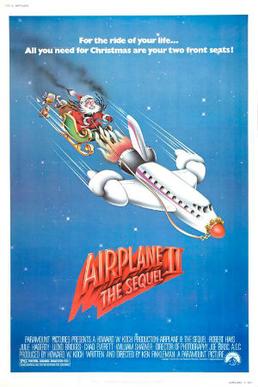- Publisher: Paramount
- Production Studio: Paramount
- Release: 10 December 1982
- Director: Ken Finkleman
- Producer: Howard J. Koch
- Writer: Ken Winkleman
Despite the rapid-fire comedy assaulting you at all times, there is a plot to be had, although since it's spelled out in bits and pieces throughout, I might as well give it to you straight now. Ted Striker (Robert Hays) has received great fame after his daring, life-saving landing in the first film. Eventually, he was hired to test-pilot a space shuttle called the Mayflower, only to have it crash. While the damage was supposedly caused by a hardware failure, the company used Ted as a fall guy and, after a trial, he was ruled as mentally insane. He is committed in an asylum until he learns that the Mayflower is about to embark on its maiden voyage to a moon colony, and breaks out to warn the passengers and crew, including his now-ex-girlfriend Elaine (Julie Hagerty).
The Mayflower takes off, with no incidents until ROC, the on-board computer, suffers a short-circuit and locks the shuttle on course to the sun. In their attempts to manually disable ROC's systems, co-pilot Unger and navigator Dunn are forced out of the airlock, and the pilot, returning Captain Oveur (Peter Graves), is nerve-gassed. So once again, Striker is drafted to take over for the pilots, with McCroskey (Lloyd Bridges) providing radio support, but this time he can't do much for himself until ROC is disabled. Then things get complicated when passenger Joe Seluchi (Sonny Bono) intends to detonate a suicide bomb in order to give his family (what he thinks is) life insurance money, but Striker confiscates it and uses (part of?) the explosives to "blow ROC" (their words, not mine) and high-tail it to the moon.
Waiting for him on the radio is the Captain of the lunar base, Buck Murdock (William Shatner), who unfortunately for Striker was involved in a bungled mission from "the war" (apparently not the same mission referred to in the first movie). But Striker is able to get over his past, and manages a safe crash-landing on the moon's surface, where somehow there is gravity and breathable air. Ladies and gentlemen, they just didn't care. So Ted and Elaine get married, and Seluchi asks for his briefcase back. You are now free to turn off your TV. So as you can see, the plot is very much a clone of the original movie's -- IN SPAAACE!! Even though the original's directors (Jim Abrams, David & Jerry Zucker) were not involved in the project, the powers that were at least were nice enough to bring back the original cast.
So does the humour set this sequel apart? It's true that some of the gags were recycled from the original. For example, in the trial flashback alone, passengers from the first movie (the Jive-as-a-second-language talker and the hysterical woman who needs sense literally beaten into her) provide testimony and replay their famous schticks. On the pop-culture side of things, while this is (thankfully) neither of the Airplane movies' strong suits, there are thinly-veiled allusions to sci-fi fare this time around, some more recent (Star Wars) than others (2001: A Space Oddysey). At the very least, I can't blame the writers for having a memory span no longer than a couple of years, unlike some guys I know.
If I could pick one point that the original Airplane! did best, it would be its ability to look at everyday occurrences, portray them in an absurdist manner, and I can't help feeling I've discussed this before. Welp, you'll be pleased to hear that Airplane II: The Sequel also has this in spades. If it takes a lot of creativity to invent gags like the spaceport's information desk which gives out increasingly non-spaceport-related information, the barrels of flammable material reading "Explosive / Dynamite / Brilliant / A Must-See", or the machine in Murdock's moon base which does nothing other than send lights back and forth across a series of tubes, then I'll certainly applaud the effort, given the alternatives. (Although given the one where visibly heavily-armed raider-types pass through a metal detector and are ignored, in retrospect this isn't always a good thing.) Too bad this sort of humour was already pioneered by the first movie.
Come to think of it, Airplane II is a retread of the original in many other ways. The characters - whether the same people or just similar roles - are recycled, and numerous events follow the same structure. (At least they made a joke about this sort of thing: at one point McCroskey poses next a portrait depicting him doing the same thing next to another portrait of him doing the same thing, muttering, "Things sure haven't changed.") It gets to the point where it's almost the same exact movie, only set in space - and they couldn't even get that part right. It's true the content of the jokes is different, and if that's enough to get you to like this, then more power to ya. But like the Airport series it set out to parody, Airplane! sadly is not immune to a formula-induced sequel slump.
Acting: 4 space shuttles out of 5
Writing: 3 space shuttles out of 5
Special Effects: 3 space shuttles out of 5
The Call: 70% (C+)

No comments:
Post a Comment